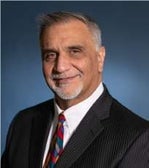The road ahead for UMass Memorial
UMass Memorial Health Care is navigating in turbulent times, but how long will they last for Central Massachusetts' largest health care system, and the region's largest employer?
To the outsider, the future seems uncertain at best. The Worcester-based organization is facing several obstacles, from operating losses requiring frequent layoffs and the sale of pieces of the business, to billing errors that have resulted in fines and a patient being infected with the hepatitis C virus in October. And the system's credit rating has been downgraded twice within the last several months by Moody's Investors Service.
Where finances are concerned, officials at UMMHC have pointed to changes in the nation's health care system as impacting revenue, and the system contends it's not alone as it works to reinvent itself for the new health care environment that holds providers accountable for the quality of care they deliver.
Rich Copp, vice president of communications at Boston-based Partners HealthCare, said that assertion rings true. Last year, Partners lost $1.1 billion in federal and state reimbursements, 9 percent more than in 2012.
“I think that large systems in Massachusetts are experiencing very similar types of pressures,” Copp said.
Changing of the guard, at a crucial time
When he became CEO last year, Eric Dickson faced a long road following the departure of his longtime predecessor, John O'Brien. Contract negotiations with the unions representing nurses at UMMHC's Worcester hospitals were going nowhere.
Nurses picketed and threatened to strike before UMass Memorial struck a deal last May that satisfied their demands for what they said were safer nurse-to-patient ratios. Then — after a summer lull — UMass Memorial announced it was facing an operating loss of $57 million at the end of its fiscal year last fall; the system was operating in the red as of the first quarter of 2014, according to Dickson's blog.
To stop the bleeding, UMMHC executives have conducted a series of layoffs, eliminating at least 357 positions across the system by the end of March. Layoffs were rumored to have continued into the beginning of April, but UMMHC has not confirmed additional cuts.
Meanwhile, the system has agreed to sell Palmer-based Wing Memorial Hospital and Medical Centers to Baystate Health of Springfield, curtailing UMMHC's reach into the western half of the state, and it had already sold its home-based health and outreach laboratory businesses in 2012 to focus on core services.
Dickson has been detailing these budget-cutting decisions on his blog, EverydayInnovators.org, which he uses to keep employees and the public informed as UMMHC transforms into a leaner organization. But through the organization's spokesman, Robert Brogna, Dickson declined to be interviewed for this story. Brogna provided written responses to questions posed to Dickson in an e-mail about operational problems and the ongoing elimination of jobs and services.
Most importantly, Brogna said the operational and financial problems UMMHC has dealt with over the last year “have not caused any deterioration to the high level of care (the system provides).”
Brogna noted that UMass Memorial Medical Center in Worcester is Central Massachusetts' only Level-1 trauma center designed to treat the seriously injured, and it's home to state-of-the-art medical treatment centers for cancer, heart problems and organ transplant, among others.
“We did have one isolated and regrettable instance of a hepatitis C infection, which we identified, investigated and reported to the appropriate agencies. We have learned from this event and have refined processes to ensure that this doesn't happen again,” Brogna wrote.
Brogna went on to detail audits that led to $1.6 million in Medicare overpayments to UMass Memorial Medical Center, which Brogna said represents less than half of 1 percent of UMMHC's Medicare revenue.
“UMMMC agreed in general with the findings of this review, and has implemented appropriate corrective actions. These actions include: refunding or reprocessing claims to Medicare, increasing staff in key risk areas, strengthening existing internal controls, enhancing staff education, and updating existing policies and procedures to reduce the risk of errors,” Brogna wrote.
Though UMMHC is working to remedy all of these woes, it's clear that they have created a potential perception problem for the system, at least among a contingent of its own employees.
The most vocal have been the nurses. Through their union, the Massachusetts Nurses Association (MNA), nurses have arguably been most influential in drawing attention to weak spots, such as a high volume of patient readmissions, resulting in significant reimbursement penalties from the Centers for Medicare and Medicaid (CMS).
MNA spokesman David Schildmeier said those readmissions have to do with staffing reductions in recent years that have caused quality to suffer. He said the MNA does not agree with management decisions that were made before Dickson became CEO, and that those decisions have directly impacted patient care.
And he said it's nothing new. Back in 2006, nurses threatened to strike amid six rounds of layoffs over a two-year period, Schildmeier said, because the hospital was requiring them to regularly work overtime to fill staffing holes.
“They basically managed their hospital system into a constant state of crisis,” Schildmeier said.
But Schildmeier is cautiously optimistic that Dickson will work in good faith to remedy some of the nurses' gripes, given his background as an emergency department physician.
“But he's walking into a real, real mess,” Schildmeier said.
O'Brien, Dickson's predecessor, who now teaches at Clark University, did not respond to a request for comment through a university spokeswoman.
Key booster for wellness
Timothy Garvin, CEO of the United Way of Central Massachusetts, offered a different perspective. Garvin said UMMHC has led important wellness initiatives in the city of Worcester, and been instrumental in supporting the United Way of Central Massachusetts' annual fundraiser to support community outreach programs. In 2013, UMMHC employees pledged roughly $300,000.
“It's important to us, because of what we do with that money,” Garvin said.
While Garvin expects commitment from UMMHC to remain strong in the future, he acknowledged that it's possible that future giving may be impacted by layoffs. But that's true for all businesses that participate in the campaign, he said.
Dickson continues to see patients in Worcester in addition to his administrative duties, and he is a professor of emergency medicine at UMass Memorial Medical School. His status as a clinician may have made him a strong pick to lead UMMHC at this time. So says Doug Elwell, managing principal at Health Management Associates, a health care consulting firm based in Lansing, Mich.
“I really think a good quality leader is a good quality leader,” Elwell said. “But sometimes, when times are tough, you want to go to a physician.”
That's because a physician is more convincing when explaining to clinical staff the need for cuts, and how patient care will not suffer, Elwell said.
Elwell has worked with numerous, high-profile health care systems, such as those in Los Angeles and San Francisco counties in California, which, like UMMHC, tend to treat a disproportionate number of low-income patients. And that's created revenue for all hospitals of their kind across the country, he said.
As for operational and quality mistakes, like those UMMHC has experienced, Elwell said it's not uncommon for a couple of unfortunate events to transpire in quick succession within large systems, but it doesn't necessarily reflect systemic weakness. And though he has never worked with UMMHC, Elwell said the system has a good name.
“It's got a good reputation, but I will tell you, a number of our hospitals who have historically had a very good reputation have had some hiccups,” Elwell said.
Dr. Wayne Glazier, head of the Central Massachusetts Independent Physicians Association (CMIPA), offered a similar point of view. Although he has avoided joining the UMMHC physicians group because he enjoys acting as his own boss, he conducts a majority of his surgery at the system's Worcester campuses.
He believes UMMHC acts primarily for the good of patients, even in light of occasional mishaps and staffing cuts, and he empathizes with the struggle to be solvent as health care reform impacts federal reimbursements.
“I think they're struggling in keeping up with the changes, as I think we all are,” Glazier said.















0 Comments